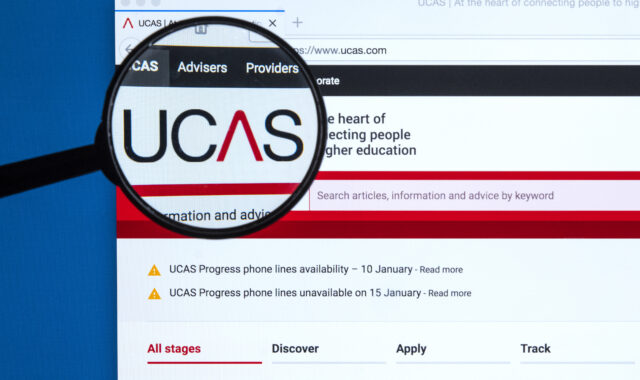Contents:
Getting started on your personal statement can be daunting; it’s a key part of your UCAS Undergraduate application, so it’s no surprise if you’re feeling the pressure.
Your personal statement is your opportunity to show your passion, enthusiasm, and dedication to your subject, as well as to highlight the attributes you can bring to university life.
Whether you’ve already begun drafting your statement or are just starting out, these 10 personal statement tips will help you create a strong, compelling application.
1. Plan, plan, plan
Before you jump straight into writing, spend some time thinking about the key points you want to include.
If you’re applying for 2026 entry, the personal statement has now been split into three separate questions. This is good news, as it helps you to structure your statement rather than having to write one long piece of text.
The three questions are:
- Question 1: Why do you want to study this course or subject?
- Question 2: How have your qualifications and studies helped you to prepare for this course or subject?
- Question 3: What else have you done to prepare outside of education, and why are these experiences useful?
Admissions staff will still read your personal statement as a single, complete piece, so avoid repeating information between sections. Make sure each answer adds something new and relevant.
When planning your responses, it may be helpful to note down your ideas using bullet points or a mindmap, which you can refer back to or add to when inspiration comes. Perhaps rank your list of skills, experiences, and achievements from most to least relevant, so that when it comes to writing, you know what to prioritise.
Each question has a minimum length requirement of 350 characters, and the overall limit of 40000 characters—including spaces—remains the same. Keep in mind that character counts in Word or Google Docs don’t always match the UCAS online form, so don’t leave pasting your final versions until the last minute!
For more information about the 2026 changes, read our article: UCAS personal statement 2026: What’s new.
2. Demonstrate your enthusiasm
Admissions tutors are looking for students who demonstrate passion, enthusiasm, and excitement for their chosen course.
Instead of using stock phrases such as “I’ve always had a fascination for biology”, explain precisely what it is about this course that motivates you and provide relevant examples of effort and experience to support this.
For example, if you’re an aspiring biologist with a fascination for natural selection, talk about an article or book you have read and refer to the concepts or ideas that particularly resonated with you.
Show how you have gone above and beyond the curriculum to develop your interests and expand your subject knowledge. Perhaps you have undertaken work experience or volunteering, or conducted an independent project, such as the Extended Project Qualification (EPQ). What did you learn from this experience, and how did it help you to develop the skills necessary for your course? This is one of the most important personal statement tips for making your statement stand out.

3. Don’t just list experiences
Following on from the last tip, admissions tutors would much rather read about a few of your experiences, accomplishments, and hobbies in depth than be presented with a long list.
Be analytical; reflect on your experiences and the insights you have gained from them. For example, what lessons did you take away from your work experience in a primary school? How did this experience shape your desire to become a teacher?
4. Be honest
Never over-exaggerate or be tempted to lie in your personal statement. For example, don’t say you’re fluent in a language if you only know a few basic phrases. Similarly, don’t claim to have read The Selfish Gene if you haven’t. The truth will come out eventually, and the last thing you’ll want to be asked in an interview is to give your rendition of the book.
But equally, don’t be self-critical and waste characters writing “I attempted to read The Selfish Gene, but I found it too challenging.” You’re trying to sell yourself, so remember to focus on your strengths!
5. Don’t just stick to academics
For question three, describe any relevant hobbies, extracurricular activities, part-time jobs, work experience, or volunteering you have undertaken, as well as any non-academic accomplishments, such as the Duke of Edinburgh Award.
Although they may not directly relate to your subject, these experiences demonstrate your talents and highlight transferable skills that are key to succeeding at university.
For each activity, clearly explain the impact it had on your personal development and the skills you gained.

6. Avoid clichés and quotes
Make your personal statement your own. Admissions tutors will be reading through scores of personal statements. Originality is key, so try to avoid using common phrases such as:
- I have always had a passion for…
- Since I was a child, I have always been interested in…
- I have always dreamed about a career in…
- Reflecting on my educational experiences…
- I am applying for this course because…
- Academically, I have always…
Equally, don’t use quotations unless they’re particularly relevant and can be used in a way which enhances your story. Personal statements are supposed to be ‘personal’, and by overusing quotations, you risk losing your own voice.
7. Mention personal circumstances
Some students have personal circumstances or responsibilities that can affect both their studies and their ability to take part in extracurricular activities. This might include caring for a family member or no longer receiving parental support.
You don’t have to include this information in your personal statement, but you may choose to do so if you want to highlight the skills and qualities you’ve developed through these experiences and explain how they could support your studies.
UCAS has written a personal statement guide for students with individual needs, including those with caring responsibilities, students who are estranged from their parents, and displaced students. It offers suggestions on how to reflect on your experiences and highlight the skills and characteristics you’ve developed.
Similarly, if you have a disability or mental health condition, it’s entirely your choice whether to mention it in your personal statement. Some students include it because it’s an important part of who they are and how they’ve grown.
8. Draft, re-draft, and re-draft again!
One of the most useful tips for writing a personal statement is to start early and give yourself plenty of time to re-draft. You (probably) aren’t going to write a perfect personal statement the first time around—hats off to you if you can! Initially, write down everything you want to say without worrying too much about the character count. From there on, you can begin to cut out the less important stuff.
Take your time; it could take five or more re-drafts of each question before you reach perfection. It may be helpful to wait a few days before reading through your final version with fresh eyes.

9. Proofread
Get someone else, or a few people, to proofread the final draft of your personal statement. Perhaps ask a family member, teacher, or friend. The more feedback you receive, the better your final version is likely to be. Of course, there is a fine balance between asking enough people and asking too many—and only implement feedback you believe to be beneficial in improving your statement.
Spelling and grammar do matter. It may be helpful to use tools such as Grammarly or Microsoft Word’s free Read Aloud function to help you spot mistakes which are easily missed by eye.
Most tips for writing a personal statement focus on content, but presentation matters too. A well-written, error-free statement leaves a strong impression.
10. Be careful when using AI tools
AI tools like ChatGPT can be helpful when writing your personal statement, but they come with significant risks, so use them wisely. Always make sure that the words and ideas are genuinely yours; admissions tutors want to hear your voice, experiences, and reasoning, not something generated by an AI bot!
UCAS warns against the use of AI tools and recommends that you check whether individual universities and colleges have specific guidelines for using AI tools like ChatGPT.
If you do decide to use AI tools, here are some guidelines to follow:
- Use AI to spark ideas, get suggestions for structure, or help reword something that feels clunky—don’t use it to write large parts of your statement verbatim. Never copy and paste!
- Check everything AI suggests—facts, dates or claims can be inaccurate or generic. If you include something suggested by AI, make sure it’s something you can back up with real experience or knowledge.
- Remember that UCAS requires you to confirm that your personal statement is your original work. If your statement is too similar to others (including ones generated by AI), it could be flagged by checks.
Using AI wisely—for planning or proofreading—can be helpful, but relying on it too much can do more harm than good. A safer tool to use is UCAS’s personal statement builder, which guides you through the structure and prompts for each required question, while automatically tracking your character count so you don’t exceed limits.
For further guidance on the use of AI tools, have a read of UCAS’s guide to using AI and ChatGPT with your personal statement.
We hope these personal statement tips help you feel more confident about writing your UCAS application. Remember, your personal statement is your chance to sell yourself and convince an admissions tutor that you are the right person for their course. Demonstrate your enthusiasm, be honest about your experiences, and highlight the skills and attributes that will make you a successful student.
FAQs
How do you write a UCAS personal statement?
Start by planning your key points: why you want to study the course, relevant academic skills and experiences, and extracurricular achievements. Write clearly and honestly, showing enthusiasm and reflection. Draft, revise, and proofread carefully, keeping within the 4,000-character limit. Use tools like UCAS’s Personal Statement Builder to help structure your responses.
How many words are needed for the UCAS personal statement?
The new UCAS personal statement 2026 format has a total limit of 4,000 characters (including spaces). Each of the three questions also has a minimum of 350 characters, so you’ll need to write at least that much for each section. Rather than worrying about word count, focus on being clear, concise, and relevant in your answers.
How should I structure my UCAS personal statement?
For 2026 applications, the UCAS personal statement is split into three questions: why you want to study the course, how your qualifications and studies have prepared you, and what else you’ve done outside of education to develop relevant skills. Structure each section clearly, avoid repeating information, and make sure your answers flow logically while showing enthusiasm, reflection, and relevant experiences.
Can I use ChatGPT to write my personal statement?
You can use ChatGPT to generate ideas, suggest structure, or help reword sentences, but you must not copy text directly. UCAS requires that your personal statement is your own work, so relying on AI to write large sections could be flagged by similarity or authenticity checks.
What should you avoid in a UCAS personal statement?
Avoid exaggerating or lying about your skills and experiences, using clichés or overused phrases, or listing experiences without reflection. Don’t repeat information between sections, and avoid relying too heavily on AI to write your statement. Focus on being honest, original, and showing your enthusiasm and suitability for the course.
How do I make my UCAS personal statement stand out?
To make your personal statement stand out, show genuine enthusiasm for your subject, reflect thoughtfully on your experiences, and highlight specific skills and achievements that relate to the course. Use clear, original language, provide concrete examples, and demonstrate personal growth.







Comments